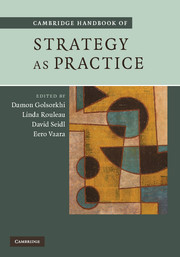Book contents
- Frontmatter
- Contents
- List of figures
- List of tables
- List of contributors
- Introduction: What is Strategy as Practice?
- PART I ONTOLOGICAL AND EPISTEMOLOGICAL QUESTIONS
- 1 Practice in research: phenomenon, perspective and philosophy
- 2 Epistemological alternatives for researching Strategy as Practice: building and dwelling worldviews
- 3 Practice, strategy making and intentionality: a Heideggerian onto-epistemology for Strategy as Practice
- 4 Constructivist epistemologies in Strategy as Practice research
- 5 Constructing contribution in ‘Strategy as Practice’ research
- 6 The challenge of developing cumulative knowledge about Strategy as Practice
- PART II THEORETICAL DIRECTIONS
- PART III METHODOLOGICAL TRACKS
- PART IV APPLICATION VARIATIONS
- Author Index
- Index
- References
3 - Practice, strategy making and intentionality: a Heideggerian onto-epistemology for Strategy as Practice
Published online by Cambridge University Press: 05 October 2012
- Frontmatter
- Contents
- List of figures
- List of tables
- List of contributors
- Introduction: What is Strategy as Practice?
- PART I ONTOLOGICAL AND EPISTEMOLOGICAL QUESTIONS
- 1 Practice in research: phenomenon, perspective and philosophy
- 2 Epistemological alternatives for researching Strategy as Practice: building and dwelling worldviews
- 3 Practice, strategy making and intentionality: a Heideggerian onto-epistemology for Strategy as Practice
- 4 Constructivist epistemologies in Strategy as Practice research
- 5 Constructing contribution in ‘Strategy as Practice’ research
- 6 The challenge of developing cumulative knowledge about Strategy as Practice
- PART II THEORETICAL DIRECTIONS
- PART III METHODOLOGICAL TRACKS
- PART IV APPLICATION VARIATIONS
- Author Index
- Index
- References
Summary
A little strategy goes a long way. Too much can paralyze or splinter an organization. That conclusion derives from the possibility that strategy-like outcomes originate from sources other than strategy.
(Karl Weick 2001, p. 345)Research on strategy from a practice perspective has been steadily gaining momentum, as attested by, among other things, several journal special issues, an increasing number of publications (including this volume) and long-standing conference streams. Although it has been a mainly European pursuit, it is also spreading to other academic milieus in other continents. Strategy as Practice calls for nothing less than a re-orientation of the field of strategy research. By re-conceiving strategy as not something organizations have but as something organizations do, Strategy as Practice is shifting the focus of analytical attention towards the making of strategy (Whittington 2006), thus departing from traditional variance-model approaches (Tsoukas and Knudsen 2002).
Insofar as this is the case, Strategy as Practice shares important assumptions with an earlier perspective in strategy research, namely the process approach. Both Strategy as Practice and process research do not treat strategy as a dependent variable, the variance of which is to be explained through the construction of a model consisting of a set of contributory variables, each one of which has its own variance (Langley 2007; Pettigrew 1992; van de Ven and Poole 2005). The main research question these two perspectives seek to address is: How do organizations make strategies (or fail to do so)?
Information
- Type
- Chapter
- Information
- Cambridge Handbook of Strategy as Practice , pp. 47 - 62Publisher: Cambridge University PressPrint publication year: 2010
References
Accessibility standard: Unknown
Why this information is here
This section outlines the accessibility features of this content - including support for screen readers, full keyboard navigation and high-contrast display options. This may not be relevant for you.Accessibility Information
- 44
- Cited by
